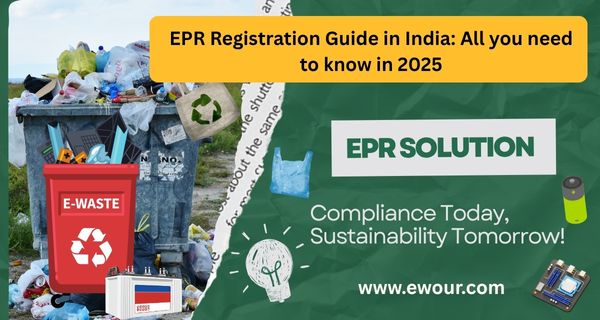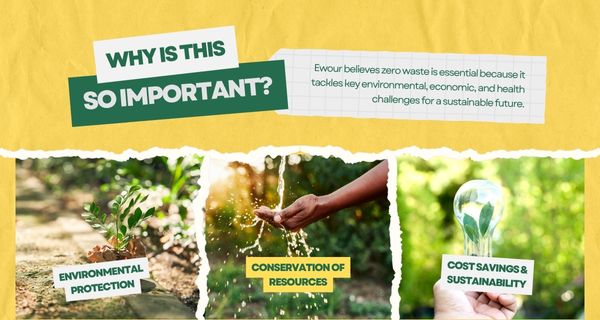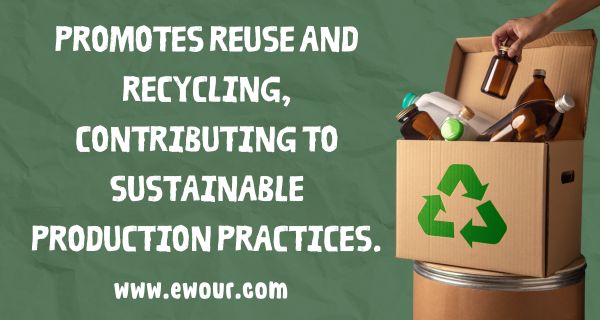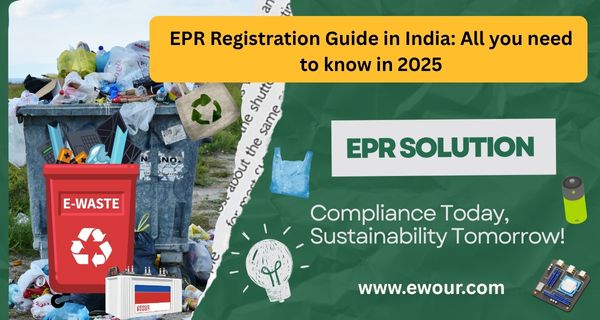Extended Producer Responsibility (EPR) is one of the major policies in India, where EPR would serve to address the increasing quantity of plastic waste and environmental sustainability. The issues of plastic waste are worsening, with continued growth of plastic consumption and declining and/or ineffective mechanisms for managing post-consumer waste. EPR shifts the responsibility of management of products onto producers, importers, and brand owners by requiring them to take full responsibility for their products throughout the lifecycle from production to recycling and final disposal. In India, the Central Pollution Control Board (CPCB) enforces compulsory EPR Registration in India, and allows for national and local municipal standards of waste management.

What is EPR?
Extended Producer Responsibility (EPR) is a regulatory framework that mandates producers, importers, and brand owners to take responsibility for managing the plastic waste generated from their products. The policy aims to ensure effective collection, recycling, and safe disposal of plastic waste to minimize environmental damage. In India, companies falling under this rule must register with the Central Pollution Control Board (CPCB) and meet specific recycling and waste management targets to remain compliant.
EPR E-Waste Registration from CPCB is a regulatory mechanism that requires producers, importers, and brand owners bear responsibility for their products’ plastic waste. EPR regulation encourages the proper collection and recycling, and environmentally safe disposal of plastic waste made by companies, thereby encouraging reducing plastics impacts on the environment. EPR rules in India means companies are required to register POP with the Central Pollution Control Board (CPCB) in order to meet the terms related to recycling and waste targets. EPR is issued by the Ministry of Environment, Forest and Climate Change (MoEF&CC) and is being implemented by the Central Pollution Control Board (CPCB) and State Pollution Control Boards (SPCBs) in India. The goal of EPR is to promote waste reduction, increase recycling opportunities, and encourage more eco-friendly product design. EPR applied to businesses must register with the appropriate regulatory agency to conduct operations in India.

Benefits of EPR Registration:
EPR registration in India and an EPR Plan have major benefits for businesses:
- Meets Legal Obligations: It helps ensure that businesses meet government obligations and avoid fines or legal action.
- Improves Brands: It builds goodwill with customers and strengthens the public image of companies as responsible environmental citizens.
- Larger Waste Management System: EPR, in reality, allows businesses and WMA members to recycle, reuse and reduce material and create better waste management systems that reduce reliance on virgin material for its packaging applications.

Application for EPR Registration Online in India
If you’re looking for an application under Extended Producer Responsibility (EPR), you can apply via the online application system on the official website of the Central Pollution Control Board (CPCB). Here’s a detailed step-by-step process on how to complete your application.
Registration on the EPR Portal of CPCB
Visit official EPR CPCB portal
- Go to the official EPR CPCB portal, and make sure that this is the authentic government website! Select the “Sign Up” button to create your account. Enter username and a password
- You will then be asked to verify your mobile number and email address using an OTP. Always use an official business email (e.g., info@yourcompany.com) to look official and credible!
Fill out EPR Registration Form
- Log into your EPR dashboard and select which type of business you have: Manufacturer, Importer, Brand Owner, or Refurbisher.
- Input your accurate details for your EPR application as: Company Name, Registered Office Address, Contact Person, Product Types (laptops, batteries, mobile phones, etc), Estimate product quantities to produce or import.
- Be sure to check every single input because even small mistakes can hold up the process.
Upload the Required Documents
Prepare and upload clear, legible copies required for EPR registration for plastic waste. Here’s an all-inclusive list of documents usually required:
- PAN Card of the entity
- Certificate of Incorporation (CIN)
- GST Registration Certificate
- Aadhaar & PAN of Authorized Person
- Factory License & MSME Certificate (if applicable)
- Air and Water Consent (if applicable)
- Product packaging pictures (JPEG format)
- Import Export Code (for importers)
- Certificate of Incorporation (CIN)
- ID Proof of Authorized Signatory (Aadhaar, Passport, etc.)
- Product brochures/specs with relevant codes
- Covering Letter on Company Letterhead
- IEC Certificate (for importers)
- Flow Diagram of Business Process
- Declaration or Affidavit (if applicable)
Make sure your documents for Battery EPR Registration India are not blurry. Keep file sizes below 5MB to avoid upload issues.
Pay the registration fee
The E Waste Management Registration fee varies based on your organization’s annual turnover: Lower turnover, Lower fee, higher turnover, and higher fee. You can make payment via UPI, net banking, or any other digital payment method available. Make sure to keep your payment receipt or take a screenshot, as it may be valuable in the future.
Check your application status
After the application has been made, log back in to the portal to see what is happening with your application status. The possible statuses are: Under Review, Queries raised (CPCB requires clarifications or edits), Approved, and Rejected. If queries were raised, act on those queries quickly with corrections or changes to avoid delays.

Download the EPR certificate
Your EPR Certificate for E-waste will automatically appear in your dashboard once approved. Download the EPR Certificate for E-waste and make multiple copies to be used in customs checks, audits, or recycling activities.
Signing up for India’s EPR program is not just a formality for businesses to show that they are complying with regulations. It is about being environmentally responsible. As society continues to struggle with plastic and e-waste management and disposal, EPR emphasizes that producers should take responsibility for their products throughout every stage of their life cycle, specifically when it is in the hands of consumers.
Moreover, by registering against EPR, businesses are playing a role in a circular economy by trying to encourage recycling with EPR, cutting down on plastic waste, and reusing materials in production. All of these measures help protect the environment, and their initiatives will make them stand out in an increasingly reputable market that values sustainable business operations.
In the end, while E Waste Management Registration may seem like another regulatory step, this is an opportunity for businesses to lead the way in green innovation and show that they truly care for the earth. It allows for better compliance, a stronger brand image, and a cleaner future for all.


